At Tooth Fairy Mobile Dental Service, we believe everyone deserves a healthy, comfortable smile—no matter their age or lifestyle. If you’re missing teeth, you may have heard about full dentures and partial dentures, but what’s the difference between them? And how do you know which one is right for you?
In this blog, we’ll explain everything you need to know in simple, easy-to-understand terms. No stress, no pressure—just helpful information to guide you toward a confident decision. And remember, our mobile dental team is here to bring personalized care directly to your door. To schedule your appointment, call us at (855) 757-6453.
What Are Full Dentures?
Full dentures are used when a patient is missing all of their natural teeth in either the upper jaw, lower jaw, or both. These removable appliances sit on the gums and are custom-made to match the shape of your mouth. Full dentures restore your ability to chew, speak clearly, and smile confidently.
They are typically made of acrylic and are carefully shaped to look like natural teeth and gums. Whether due to tooth decay, gum disease, or aging, full dentures can be a great option for someone who no longer has any of their natural teeth in a particular arch.
Benefits of Full Dentures:
-
Restore the appearance of a full, healthy smile
-
Allow you to eat and speak more comfortably
-
Support your facial structure and prevent sagging
-
Removable for easy cleaning
-
A cost-effective solution for complete tooth loss
What Are Partial Dentures?
Partial dentures are designed for patients who still have some of their natural teeth. These dentures fill in the gaps left by missing teeth and are held in place by clasps or precision attachments that connect to your existing teeth.
Partial dentures not only restore your smile but also help keep your remaining teeth from shifting out of place. Like full dentures, they are custom-made for your mouth, ensuring a secure and comfortable fit.
Benefits of Partial Dentures:
-
Replace multiple missing teeth without extracting healthy ones
-
Help prevent teeth from shifting
-
Improve chewing and speech
-
Often more affordable than other restorative options like bridges or implants
-
Can be used as a temporary or long-term solution
Key Differences Between Full and Partial Dentures
The main difference lies in how many teeth you’re missing. Full dentures are meant for people who have lost all of their teeth in one or both arches. In contrast, partial dentures are best for those who are only missing some teeth and still have healthy ones remaining.
Full dentures sit directly on the gums, while partial dentures are supported by the remaining natural teeth. Your dentist will help you decide which is better for you based on your oral health, your goals, and your budget.
What to Expect During the Denture Process
We understand that getting dentures can seem like a big step. That’s why our mobile dental team focuses on making the experience as smooth and comfortable as possible—from your first visit to your final fitting.
Here’s a general idea of what the process looks like:
-
Consultation: We’ll evaluate your oral health and discuss your needs.
-
Impressions: We take precise measurements of your mouth to design your dentures.
-
Fitting: Your custom dentures are fitted and adjusted for comfort.
-
Care Instructions: We’ll show you how to clean and care for your new dentures.
-
Follow-Up Visits: We stay in touch to ensure everything continues to fit and feel right.
And best of all, we bring this care to you—right in the comfort of your own home.
Tips for Living Comfortably with Dentures
-
Practice talking: Reading out loud or chatting with family helps you adjust more quickly.
-
Start with soft foods: Then slowly reintroduce firmer foods once you’re comfortable.
-
Clean them daily: Use a soft brush and denture cleaner to keep them fresh.
-
Give your mouth a break: Removing dentures at night helps your gums rest.
-
Stay in touch with your dentist: Regular check-ins help ensure a proper fit and spot any issues early.
Why Choose Tooth Fairy Mobile Dental Service?
We’re more than a dental service—we’re a partner in your health journey. At Tooth Fairy Mobile Dental Service, we make dental care easy, affordable, and personal. Whether you need full dentures, partial dentures, or just want to explore your options, we’re here to guide you with compassion and expertise.
And with our mobile service, there’s no need to travel. We come to you—at your home, assisted living facility, or wherever you feel comfortable. Call us today at (855) 757-6453 to schedule your visit.
Frequently Asked Questions (FAQs)
1. Will dentures feel uncomfortable?
It might take a short time to adjust, but your dentures will be carefully fitted and adjusted for comfort. Most patients adapt quickly.
2. How long do dentures last?
With good care, dentures usually last between 5 to 10 years. Over time, your mouth shape may change, so occasional adjustments or replacements are normal.
3. Can I eat normally with dentures?
Yes! While there’s an adjustment period, most people can return to eating a variety of foods. Start with soft foods and gradually work your way up.
4. Are partial dentures better than full dentures?
It depends on how many teeth you have remaining. If you still have healthy teeth, a partial denture is often the best choice to support them and fill gaps.
5. Can I sleep with my dentures in?
You can, but we recommend taking them out at night to allow your gums to rest and reduce the risk of infections.
If you or a loved one is considering full or partial dentures, don’t wait—call Tooth Fairy Mobile Dental Service at (855) 757-6453 and let us bring quality dental care directly to you.

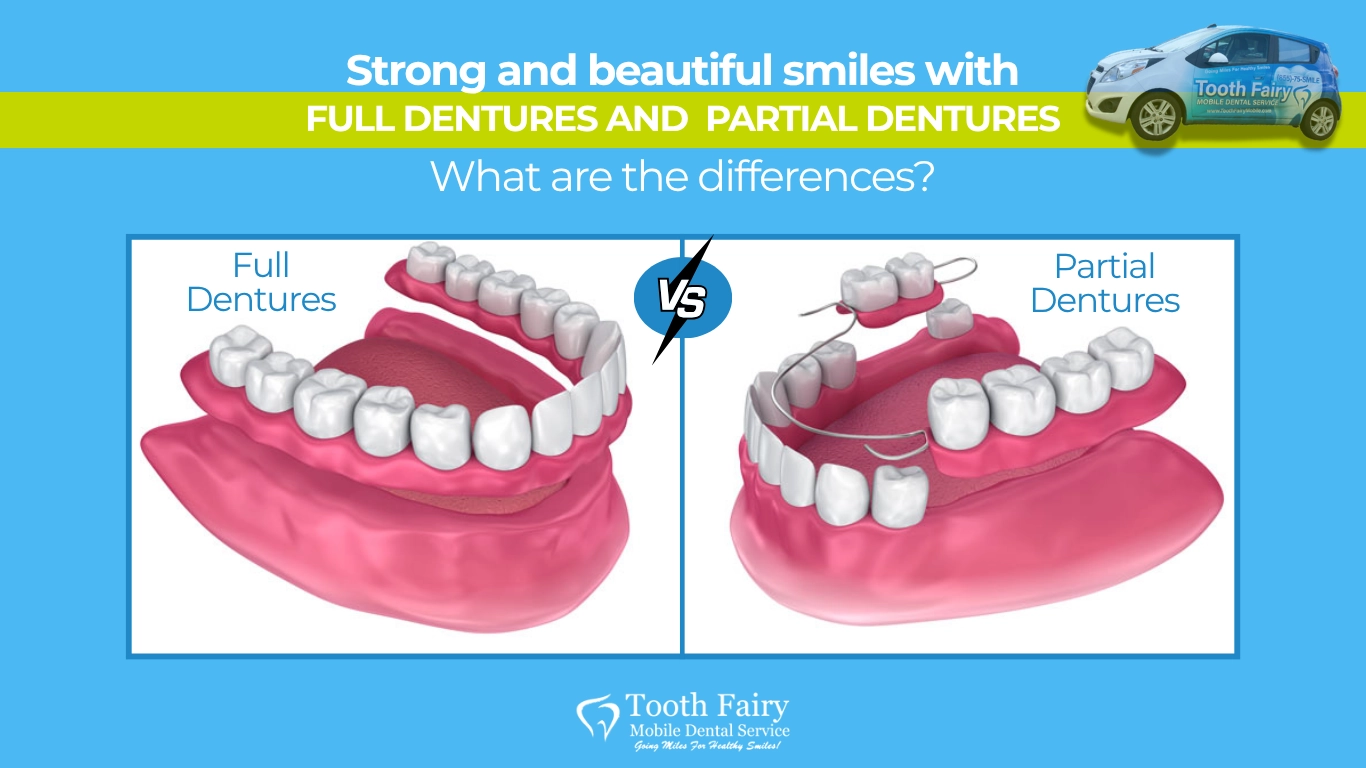

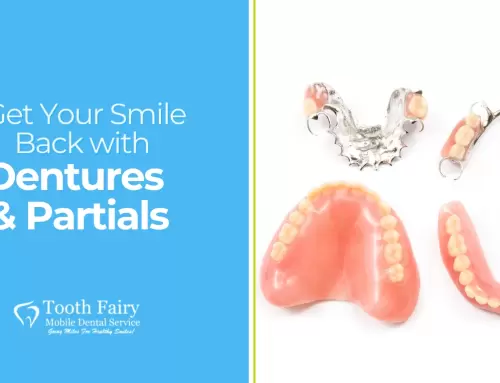
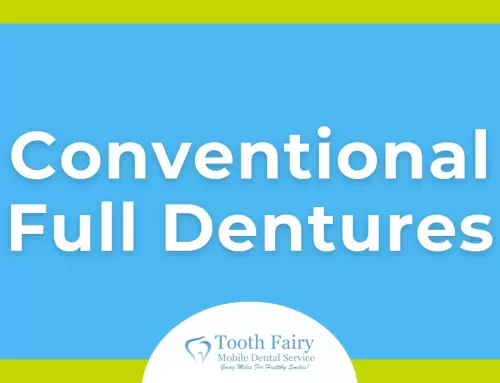
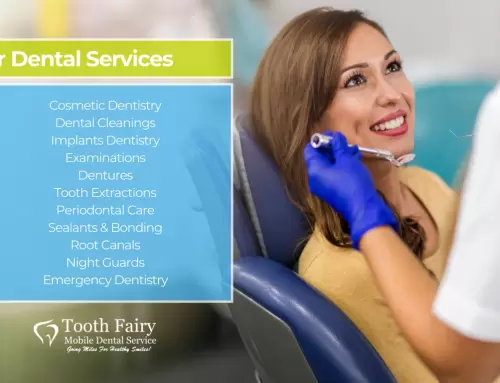

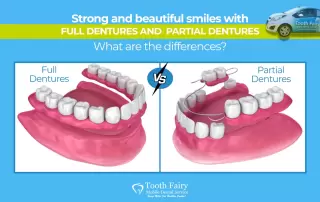

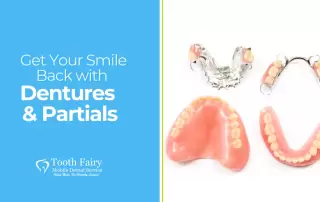
Leave A Comment